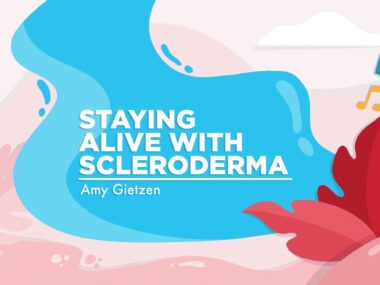Coping with loss is part of living with scleroderma
Grief can put stress on our body, so learning to manage it is crucial
Written by |

As someone with scleroderma, I’ve experienced multiple types of loss. There’s the unique grief of living with a chronic illness: I miss my life before scleroderma took hold, I miss the way my body used to be, and I miss being “normal.”
I also miss my friends who have died from the disease.
Sharing life experiences, both good and bad, is an essential part of being human. This is especially important for people with rare diseases. I have a strong bond with all of my scleroderma friends because we understand what it’s like to live with the illness.
Two months ago, I lost one of my closest friends, Demeshia “Demi” Montgomery. Demi was a patient advocate, entrepreneur, wife, and mother. Although she lived several states away from me and we had never met in person, we were very close. It wasn’t just the shared experience of scleroderma that bonded us; we also had similar tastes in movies, food, and humor. Demi was my patient advocacy mentor, as well.
I regret that we were never able to meet in person. When Demi died in the hospital in August, I was shocked and devastated, because my last conversation with her had taken place only a few days earlier. When she passed, the scleroderma and rare disease communities lost a great friend, a strong advocate, and a tireless warrior.
Loss is never easy to deal with, whether it’s the loss of a family member, close friend, or your old self. It’s one of life’s greatest stressors, according to the Hospice Foundation of America, and “can affect you in physical, cognitive, emotional, behavioral, social, spiritual, and practical ways.”
Navigating grief with scleroderma
Grief can put stress on the body, which is especially harmful for people living with autoimmune diseases like scleroderma. Stress can lead to pain and inflammation and even alter the gut microbiome.
Studies have shown that people with scleroderma have more inflammation-causing bacteria in their gut. Gut bacteria has also been linked to disease severity in systemic sclerosis-associated interstitial lung disease. As a result, additional stress on our gut can be damaging.
I know it’s not possible to completely eliminate stress from our lives, but there are ways we can manage it.
One way is by engaging in mental or spiritual practices such as meditation. There are physical things we can do, as well. Engaging in regular physical activity helps to decrease stress hormones and improve brain health. And eating an anti-inflammatory diet that includes fruits and vegetables can help to reduce inflammation and combat the effects of stress.
In dealing with loss, it’s important to accept your emotions. Don’t ignore what you are feeling. When I learned that Demi had died, I talked to my family about it and gave myself permission to rest and grieve. I watched some movies and took it easy on myself.
Everyone experiences loss and grief differently, and dealing with emotional pain takes time. My mother used to say that time heals all wounds. I believe that time eases pain. We never forget the people we’ve lost, but over time, the pain becomes easier to deal with. I’ll keep doing my best to cope with the losses I’ve experienced, and I will never forget my friend.
Note: Scleroderma News is strictly a news and information website about the disease. It does not provide medical advice, diagnosis, or treatment. This content is not intended to be a substitute for professional medical advice, diagnosis, or treatment. Always seek the advice of your physician or other qualified health provider with any questions you may have regarding a medical condition. Never disregard professional medical advice or delay in seeking it because of something you have read on this website. The opinions expressed in this column are not those of Scleroderma News or its parent company, Bionews, and are intended to spark discussion about issues pertaining to scleroderma.







Leave a comment
Fill in the required fields to post. Your email address will not be published.